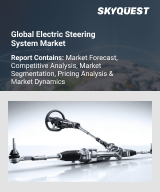
|
시장보고서
상품코드
1673547
자동차 스티어링 시스템 시장 규모, 점유율, 성장 분석 : 기술별, 차량 유형별, 기기 유형별, 컴포넌트별, 지역별 - 산업 예측(2025-2032년)Automotive Steering System Market Size, Share, and Growth Analysis, By Technology, By Vehicle Type, By Equipment Type, By Component, By Region - Industry Forecast 2025-2032 |
||||||
자동차 스티어링 시스템 시장 규모는 2023년 342억 달러로 평가되었고, 2024년 361억 2,000만 달러에 달했습니다. 2032년에는 558억 5,000만 달러로 성장할 전망이며, 예측 기간(2025-2032년)의 CAGR은 5.6%를 나타낼 전망입니다.
세계 자동차 스티어링 시스템 시장은 세계 자동차 수요의 급증으로 강력한 성장을 이루고 있습니다. 제조업체가 저연비로 전기자동차 생산에 주력함에 따라 고급 스티어링 시스템의 중요성이 더욱 커지고 자동차 네비게이션과 안전성이 향상되었습니다. 이 추세는 운전 중 편안함을 추구하는 소비자의 선호도를 높여 전동 파워 스티어링 기술의 통합이 진행되는 길을 열고 있습니다. 이러한 기회를 활용하기 위해 주요 기업은 제품의 다양화와 개선에 주력하고 있습니다. 또한 혁신적인 스티어링 시스템 기술에 대한 정부 투자와 전기자동차 판매량 증가로 시장 확대가 더욱 가속화되고 있습니다. 전반적으로 자동차 스티어링 시스템 시장은 진화하는 소비자 수요와 기술의 진보에 힘입어 크게 성장하는 태세를 갖추고 있습니다.
목차
소개
- 조사의 목적
- 조사 범위
- 정의
조사 방법
- 정보 조달
- 2차와 1차 데이터의 방법
- 시장 규모 예측
- 시장의 전제조건과 제한
주요 요약
- 세계 시장 전망
- 공급과 수요 동향 분석
- 부문별 기회 분석
시장 역학과 전망
- 시장 개요
- 시장 규모
- 시장 역학
- 성장 촉진요인과 기회
- 성장 억제요인과 과제
- Porter's Five Forces 분석
주요 시장 인사이트
- 중요성공요인
- 경쟁도
- 주요 투자 기회
- 시장 생태계
- 시장의 매력 지수(2024년)
- PESTEL 분석
- 거시경제지표
- 밸류체인 분석
- 가격 분석
- 특허 분석
- 기술 분석
- 사례 연구
- 규제 분석
자동차 스티어링 시스템 시장 규모 : 기술별 & CAGR(2025-2032)
- 시장 개요
- 유압 파워 스티어링(HPS)
- 전동 유압 파워 스티어링(EHPS)
- 전동 파워 스티어링(EPS)
자동차 스티어링 시스템 시장 규모 : 차량 유형별 & CAGR(2025-2032)
- 시장 개요
- 승용차
- 소형 상용차(LCVS)
- 대형 상용차(HCVS)
자동차 스티어링 시스템 시장 규모 : 기기 유형별 & CAGR(2025-2032)
- 시장 개요
- 농업용 트랙터
- 건설기계
자동차 스티어링 시스템 시장 규모 : 컴포넌트별 & CAGR(2025-2032)
- 시장 개요
- 유압 펌프
- 스티어링 칼럼
- 스티어링 각도 센서
- 토크 센서
- 전자제어유닛
- 전기 모터
- 기계식 랙과 피니언
- 베어링
자동차 스티어링 시스템 시장 규모 : 유형별 & CAGR(2025-2032)
- 시장 개요
- 컬럼 EPS(C-EPS)
- 피니언 EPS(P-EPS)
- 랙 EPS(R-EPS)
자동차 스티어링 시스템 시장 규모 : 전기자동차유형별& CAGR(2025-2032)
- 시장 개요
- 배터리 전기자동차(BEV)
- 플러그인 하이브리드 전기자동차(PHEV)
- 연료전지 전기자동차(FCEV)
자동차 스티어링 시스템 시장 규모 : 전동 모터 유형별& CAGR(2025-2032)
- 시장 개요
- 브러시 DC 모터
- 브러시리스 DC 모터
자동차 스티어링 시스템 시장 규모 : 기구별& CAGR(2025-2032)
- 시장 개요
- 접이식 EPS
- 강성 EPS
자동차 스티어링 시스템 시장 규모 : 피니언 유형별 & CAGR(2025-2032)
- 시장 개요
- 싱글 피니언
- 듀얼 피니언
자동차 스티어링 시스템 시장 규모 : 컴포넌트별 & CAGR(2025-2032)
- 시장 개요
- 유압 펌프
- 스티어링 칼럼
- 전기 모터
자동차 스티어링 시스템 시장 규모 : 지역별 & CAGR(2025-2032)
- 북미
- 미국
- 캐나다
- 유럽
- 독일
- 스페인
- 프랑스
- 영국
- 이탈리아
- 기타 유럽
- 아시아태평양
- 중국
- 인도
- 일본
- 한국
- 기타 아시아태평양
- 라틴아메리카
- 브라질
- 기타 라틴아메리카
- 중동 및 아프리카
- GCC 국가
- 남아프리카
- 기타 중동 및 아프리카
경쟁 정보
- 상위 5개사 비교
- 주요 기업의 시장 포지셔닝(2024년)
- 주요 시장 기업이 채용한 전략
- 최근 시장 동향
- 기업의 시장 점유율 분석(2024년)
- 주요 기업의 기업 프로파일
- 기업의 상세
- 제품 포트폴리오 분석
- 기업의 부문별 점유율 분석
- 수익의 전년대비 비교(2022-2024년)
주요 기업 프로파일
- Robert Bosch GmbH(Germany)
- JTEKT Corporation(Japan)
- Nexteer Automotive Group Limited(United States)
- NSK Ltd.(Japan)
- ThyssenKrupp AG(Germany)
- ZF Friedrichshafen AG(Germany)
- China Automotive Systems Inc.(China)
- Hyundai Mobis Co.Ltd.(South Korea)
- Mando Corporation(South Korea)
- Showa Corporation(Japan)
- Federal-Mogul Corporation(United States)
결론과 권고
SHW 25.04.11Automotive Steering System Market size was valued at USD 34.2 billion in 2023 and is poised to grow from USD 36.12 billion in 2024 to USD 55.85 billion by 2032, growing at a CAGR of 5.6% during the forecast period (2025-2032).
The global automotive steering system market is experiencing robust growth driven by the surging demand for vehicles worldwide. As manufacturers pivot towards producing more fuel-efficient and electric vehicles, the importance of advanced steering systems becomes even more pronounced, enhancing vehicle navigation and safety. This trend is paving the way for increased integration of electric power steering technologies, reflecting a growing consumer preference for comfort in driving. To capitalize on these opportunities, key players are focusing on diversifying and improving their product offerings. Additionally, government investments in innovative steering system technologies and the rising sales of electric vehicles further accelerate market expansion. Overall, the automotive steering system market is poised for significant growth, fueled by evolving consumer demands and technological advancements.
Top-down and bottom-up approaches were used to estimate and validate the size of the Automotive Steering System market and to estimate the size of various other dependent submarkets. The research methodology used to estimate the market size includes the following details: The key players in the market were identified through secondary research, and their market shares in the respective regions were determined through primary and secondary research. This entire procedure includes the study of the annual and financial reports of the top market players and extensive interviews for key insights from industry leaders such as CEOs, VPs, directors, and marketing executives. All percentage shares split, and breakdowns were determined using secondary sources and verified through Primary sources. All possible parameters that affect the markets covered in this research study have been accounted for, viewed in extensive detail, verified through primary research, and analyzed to get the final quantitative and qualitative data.
Automotive Steering System Market Segments Analysis
Global Automotive Steering System Market is segmented by Technology, Vehicle Type, Equipment Type, Component, Type, Electric Vehicle Type, Electric Motor Type, Mechanism, Pinion Type and region. Based on Technology, the market is segmented into Hydraulic Power Steering (HPS), Electrically Assisted Hydraulic Power Steering (EHPS) and Electric Power Steering (EPS). Based on Vehicle Type, the market is segmented into Passenger Cars, Light Commercial Vehicles (LCVS) and Heavy Commercial Vehicles (HCVS). Based on Equipment Type, the market is segmented into Agricultural Tractors and Construction Equipment. Based on Component, the market is segmented into Hydraulic Pumps, Steering Columns and Electric Motors. Based on Type, the market is segmented into Column-EPS (C-EPS), Pinion-EPS (P-EPS) and Rack-EPS (R-EPS). Based on Electric Vehicle Type, the market is segmented into Battery Electric Vehicle (BEV), Plug-In Hybrid Electric Vehicle (PHEV) and Fuel Cell Electric Vehicle (FCEV). Based on Electric Motor Type, the market is segmented into Brushed DC Motor and Brushless DC Motor. Based on Mechanism, the market is segmented into Collapsible EPS and Rigid EPS. Based on Pinion Type, the market is segmented into Single Pinion and Dual Pinion. Based on region, the market is segmented into North America, Europe, Asia Pacific, Latin America and Middle East & Africa.
Driver of the Automotive Steering System Market
The global push for stringent pollution regulations is anticipated to significantly boost the electric vehicle market, consequently driving up the demand for automotive steering systems. Additionally, the automotive steering system market is experiencing growth fueled by a growing consumer preference for advanced driver assistance systems in vehicles. As electric vehicles proliferate and technologies aimed at enhancing driving experiences continue to evolve, the automotive steering system market is well-positioned for expansion in response to these emerging trends. Enhanced safety and improved vehicle performance are crucial elements contributing to this upward trajectory in market demand.
Restraints in the Automotive Steering System Market
The automotive steering system market faces several challenges that may hinder its growth. The dominance of Electric Power Steering (EPS) systems in passenger vehicles, primarily due to their efficiency and superior fuel economy, has shifted consumer preferences, resulting in an increased demand for passenger cars while diminishing the demand for commercial vehicles. Furthermore, the high cost associated with power steering systems is likely to obstruct the overall expansion of the automotive sector. Additionally, the advancement of autonomous vehicles, along with competitive pricing, could further impede the growth prospects of the automotive industry, presenting significant market constraints.
Market Trends of the Automotive Steering System Market
The Automotive Steering System market is experiencing significant growth, driven by the escalating global demand for vehicles and an increasing reliance on advanced power steering systems that enhance vehicle control and fuel efficiency. The shift towards fuel-efficient cars is propelling the market further, bolstered by governmental regulations aimed at reducing carbon emissions across fleets. Additionally, the rising adoption of Electric Power Steering (EPS) systems emphasizes a focus on improving driving safety and convenience. The integration of sensors in steering systems is also shaping the market positively, reflecting the broader trend towards enhanced technology and innovation in the automotive sector.
Table of Contents
Introduction
- Objectives of the Study
- Scope of the Report
- Definitions
Research Methodology
- Information Procurement
- Secondary & Primary Data Methods
- Market Size Estimation
- Market Assumptions & Limitations
Executive Summary
- Global Market Outlook
- Supply & Demand Trend Analysis
- Segmental Opportunity Analysis
Market Dynamics & Outlook
- Market Overview
- Market Size
- Market Dynamics
- Drivers & Opportunities
- Restraints & Challenges
- Porters Analysis
- Competitive rivalry
- Threat of substitute
- Bargaining power of buyers
- Threat of new entrants
- Bargaining power of suppliers
Key Market Insights
- Key Success Factors
- Degree of Competition
- Top Investment Pockets
- Market Ecosystem
- Market Attractiveness Index, 2024
- PESTEL Analysis
- Macro-Economic Indicators
- Value Chain Analysis
- Pricing Analysis
- Patent Analysis
- Technology Analysis
- Case Studies
- Regulatory Analysis
Global Automotive Steering System Market Size by Technology & CAGR (2025-2032)
- Market Overview
- Hydraulic Power Steering (HPS)
- Electrically Assisted Hydraulic Power Steering (EHPS)
- Electric Power Steering (EPS)
Global Automotive Steering System Market Size by Vehicle Type & CAGR (2025-2032)
- Market Overview
- Passenger Cars
- Light Commercial Vehicles (LCVS)
- Heavy Commercial Vehicles (HCVS)
Global Automotive Steering System Market Size by Equipment Type & CAGR (2025-2032)
- Market Overview
- Agricultural Tractors
- Construction Equipment
Global Automotive Steering System Market Size by Component & CAGR (2025-2032)
- Market Overview
- Hydraulic Pumps
- Steering Columns
- Steering Angle Sensors
- Torque Sensors
- Electronic Control Units
- Electric Motors
- Mechanical Racks And Pinions
- Bearings
Global Automotive Steering System Market Size by Type & CAGR (2025-2032)
- Market Overview
- Column-EPS (C-EPS)
- Pinion-EPS (P-EPS)
- Rack-EPS (R-EPS)
Global Automotive Steering System Market Size by Electric Vehicle Type & CAGR (2025-2032)
- Market Overview
- Battery Electric Vehicle (BEV)
- Plug-In Hybrid Electric Vehicle (PHEV)
- Fuel Cell Electric Vehicle (FCEV)
Global Automotive Steering System Market Size by Electric Motor Type & CAGR (2025-2032)
- Market Overview
- Brushed DC Motor
- Brushless DC Motor
Global Automotive Steering System Market Size by Mechanism & CAGR (2025-2032)
- Market Overview
- Collapsible EPS
- Rigid EPS
Global Automotive Steering System Market Size by Pinion Type & CAGR (2025-2032)
- Market Overview
- Single Pinion
- Dual Pinion
Global Automotive Steering System Market Size by Component & CAGR (2025-2032)
- Market Overview
- Hydraulic Pumps
- Steering Columns
- Electric Motors
Global Automotive Steering System Market Size & CAGR (2025-2032)
- North America (Technology, Vehicle Type, Equipment Type, Component, Type, Electric Vehicle Type, Electric Motor Type, Mechanism, Pinion Type, Component)
- US
- Canada
- Europe (Technology, Vehicle Type, Equipment Type, Component, Type, Electric Vehicle Type, Electric Motor Type, Mechanism, Pinion Type, Component)
- Germany
- Spain
- France
- UK
- Italy
- Rest of Europe
- Asia Pacific (Technology, Vehicle Type, Equipment Type, Component, Type, Electric Vehicle Type, Electric Motor Type, Mechanism, Pinion Type, Component)
- China
- India
- Japan
- South Korea
- Rest of Asia-Pacific
- Latin America (Technology, Vehicle Type, Equipment Type, Component, Type, Electric Vehicle Type, Electric Motor Type, Mechanism, Pinion Type, Component)
- Brazil
- Rest of Latin America
- Middle East & Africa (Technology, Vehicle Type, Equipment Type, Component, Type, Electric Vehicle Type, Electric Motor Type, Mechanism, Pinion Type, Component)
- GCC Countries
- South Africa
- Rest of Middle East & Africa
Competitive Intelligence
- Top 5 Player Comparison
- Market Positioning of Key Players, 2024
- Strategies Adopted by Key Market Players
- Recent Developments in the Market
- Company Market Share Analysis, 2024
- Company Profiles of All Key Players
- Company Details
- Product Portfolio Analysis
- Company's Segmental Share Analysis
- Revenue Y-O-Y Comparison (2022-2024)
Key Company Profiles
- Robert Bosch GmbH (Germany)
- Company Overview
- Business Segment Overview
- Financial Updates
- Key Developments
- JTEKT Corporation (Japan)
- Company Overview
- Business Segment Overview
- Financial Updates
- Key Developments
- Nexteer Automotive Group Limited (United States)
- Company Overview
- Business Segment Overview
- Financial Updates
- Key Developments
- NSK Ltd. (Japan)
- Company Overview
- Business Segment Overview
- Financial Updates
- Key Developments
- ThyssenKrupp AG (Germany)
- Company Overview
- Business Segment Overview
- Financial Updates
- Key Developments
- ZF Friedrichshafen AG (Germany)
- Company Overview
- Business Segment Overview
- Financial Updates
- Key Developments
- China Automotive Systems Inc. (China)
- Company Overview
- Business Segment Overview
- Financial Updates
- Key Developments
- Hyundai Mobis Co. Ltd. (South Korea)
- Company Overview
- Business Segment Overview
- Financial Updates
- Key Developments
- Mando Corporation (South Korea)
- Company Overview
- Business Segment Overview
- Financial Updates
- Key Developments
- Showa Corporation (Japan)
- Company Overview
- Business Segment Overview
- Financial Updates
- Key Developments
- Federal-Mogul Corporation (United States)
- Company Overview
- Business Segment Overview
- Financial Updates
- Key Developments



















